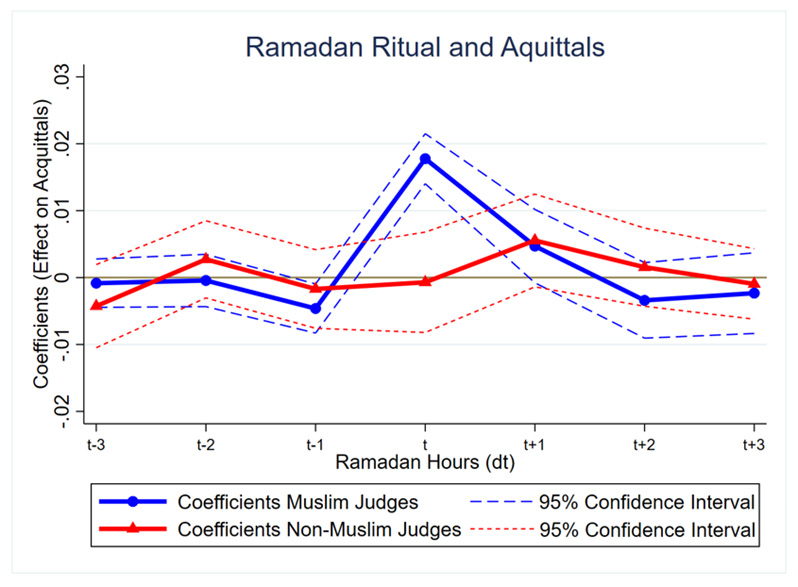Sultan Mehmood, Avner Seror, Daniel L. Chen, 2023, Nature Human Behaviour, 7(6), pp. 874-880
»
Cases adjudicated by Muslim judges during Ramadan are more leniently decided,
less often reversed, and result in no lower recidivism or out-group bias.
RESEARCH PROGRAM
Rituals have significant implications for behavior and decision-making, even in domains expected to be objective, such as judicial decisions. Existing literature highlights how extraneous factors—like weather and political climates—can impact judicial outcomes, challenging the notion of impartiality. This study explores the influence of Ramadan, a prominent Islamic ritual, on judicial leniency and decision quality. Using a dataset spanning 50 years of criminal sentencing in India and Pakistan, this research examines whether the fasting and reflection inherent in Ramadan affect judicial adjudication.
PAPER’S CONTRIBUTIONS
This paper makes several contributions to our understanding of judicial decision-making and the broader impact of rituals:
1. Empirical Evidence of Increased Leniency: The study finds that Muslim judges during Ramadan are 10% more likely to acquit with each additional hour of fasting. This increased leniency does not diminish judgment quality, as shown by a 4% decrease in the probability of reversed decisions in higher courts.
2. Conceptual Framework: The research identifies two channels through which Ramadan may influence judicial decisions: negative effects of physiological deprivation and positive effects of enhanced moral reflection. The findings suggest the latter channel predominates, given the lower recidivism rates and absence of bias against non-Muslim litigants.
3. Overcoming Empirical Challenges: The study addresses three key empirical challenges:
- Variation in Length of Fasting: By exploiting geographic latitude differences, the study uses variations in length of fasting within the same day as a measure of ritual intensity. For example, during winter, daily fasting hours are longer in Tirunelveli than in Kupwara because Tirunelveli is closer to the equator. Conversely, in summer, the fasting hours in Tirunelveli are shorter than in Kupwara. This latitude-induced variation provides a natural experiment to isolate the impact of fasting intensity.
- Temporal Variation: The lunar calendar’s shift across seasons allows the study to separate the effects of Ramadan from seasonal effects. This temporal variation helps ensure that observed effects are due to Ramadan itself rather than coinciding seasonal factors.
- Random Case Assignment: Random assignment of cases to Muslim and non-Muslim judges provides a natural experiment setting to isolate the impact of Ramadan. The decisions of nonMuslim judges serve as a control group, helping to confirm that the observed leniency is not a statistical artifact but a genuine effect of the fasting ritual.
By leveraging these variations, the study disentangles the effects of ritual intensity from broader societal and seasonal influences.
FUTURE RESEARCH
This study paves the way for several future research directions:
1. Mechanisms of Influence: Future research should delve into the psychological and physiological mechanisms driving increased leniency during Ramadan. Understanding whether cognitive changes, enhanced moral reflection, or other factors are at play could provide deeper insights.
2. Comparative Studies: Investigating the impact of other religious or cultural rituals on judicial decisionmaking in diverse contexts would help identify universal patterns and context-specific effects.
3. Long-Term Impacts: Examining the long-term effects of ritual-influenced decision-making on criminal justice systems, such as crime rates and prison populations, could provide valuable insights into the broader implications of these findings.
Continued research in these areas will enhance our understanding of the complex relationship between rituals and decision-making, leading to more informed policies and practices in judicial systems globally.

Figure: Ramadan Ritual and Acquittals
→ This article was issued in AMSE Newletter, Summer 2024.






